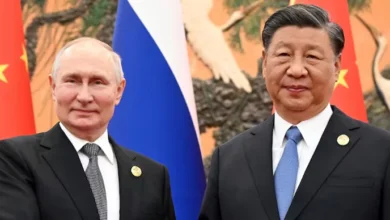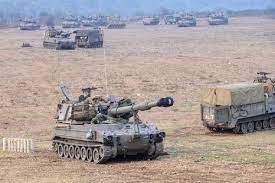After Iran’s airstrike, Netanyahu dismisses calls for moderation, saying, “We Will Make Our Decisions Ourselves.”
Benjamin Netanyahu, the prime minister of Israel, dismissed appeals for moderation from close friends on Wednesday, stating that his nation will choose if and how to react to Iran’s massive airstrike earlier this week.

After months of unrest connected to the continuing conflict in Gaza, Israel has pledged to retaliate to Iran’s unprecedented strike, but it has not said when or how. As a result, the region is preparing for additional escalation.
Since the incident, Israel’s friends have pleaded with it to refrain from taking any action that may backfire. During visits on Wednesday, the foreign ministers of Germany and Britain reiterated these requests.
Iran’s president issued a warning that even the “tiniest” invasion of its land would result in a “massive and harsh” reaction, prompting diplomatic pressures. Meanwhile, on Wednesday, missile and drone attacks on northern Israel by the Iran-backed terrorist Lebanese organization Hezbollah caused a spike in violence. According to the IDF, the assault injured at least 14 Israeli troops, six of them critically. In retaliation, the military claimed to have hit Hezbollah sites deep in Lebanon.
Speaking to his Cabinet, Netanyahu said that he had a meeting with the two visiting foreign ministers on Wednesday and expressed gratitude for their nations’ assistance. He said, however, that Israel will decide how to react on its own in spite of “all sorts of suggestions and advice” from Israel’s friends, some of which, like the US, the UK, and France, assisted Israel in fending off Iran’s drone and missile attack.
To be clear, we are going to decide for ourselves. According to Netanyahu, “the state of Israel will take all necessary measures to defend itself.”
Even with its aggressive rhetoric, Israel doesn’t seem inclined to strike Iran directly without at least the U.S.’s cooperation. However, it may turn to more clandestine strategies like cyberattacks or focusing on top Iranian commanders or organizations that get support from Iran abroad.
Given the elevated tensions, it is uncertain how Iran would react; any mistake on any side may spark a regional conflict.
The administration of President Joe Biden said on Tuesday that it will impose further penalties on Iran and that it is organizing a worldwide condemnation of the assault, all the while pushing parties to defuse the situation. Biden assured Netanyahu that Washington would not take any aggressive action against Iran, according to statements made by American officials earlier this week.
Iran fired hundreds of missiles and drones toward Israel over the weekend in retaliation for what seemed to be an Israeli raid on the Iranian embassy complex in Syria on April 1 that claimed the lives of 12 individuals, including two Iranian generals.
Israel claims that almost all of the missiles and drones were successfully intercepted by it and its allies. The incident resulted in minor injuries to a 7-year-old child but no fatalities or significant property damage.
Although Iran and Israel have been engaged in a covert conflict for many years, this past weekend’s attack was Iran’s first outright military assault on Israeli territory.
Israel’s friends have reaffirmed a message of moderation amid rising tensions. During their individual trips to the area, German Foreign Minister Annalena Baerbock and British Foreign Secretary David Cameron both urged calm.
It’s certain that the Israelis are choosing to take action against Iran, according to Cameron, but he hoped that they would act “toughly and strategically and in a way that does as little as possible to escalate this conflict.” Following a meeting with Israel’s ceremonial president, Isaac Herzog, he addressed.
Germany is “in full solidarity with Israel,” according to Baerbock, although caution is advised.
“Everyone has to behave sensibly and properly right now. I’m not referring to caving in. She told reporters, “I’m talking about sensible restraint, which is nothing less than strength. “Because Israel’s victory over the weekend on defense already demonstrated strength.”
The ministers vowed to support the imposition of more international sanctions on Iran.
Iran’s President Ebrahim Raisi attended an annual army parade that had been moved from its customary route to a barracks and was not shown live on state TV, probably out of concern that it might be attacked. Raisi cautioned Israel against any retribution.
Raisi said in statements broadcast by Iran’s official IRNA news agency that the strike over the weekend was contained and that “nothing would remain from the Zionist regime” if Iran had decided to launch a larger operation.
Following the assault on southern Israel on October 7 by Iranian-backed Palestinian terrorist organizations Hamas and Islamic Jihad, tensions in the region have escalated dramatically. About 1,200 Israelis were murdered in the assault, while 250 hostages were taken prisoner by the extremists. In response, Israel launched one of the bloodiest and most devastating military assaults in recent memory, killing around 34,000 Palestinians, according to Gaza health authorities. These officials do not differentiate between fighters and civilians when calculating the death toll, although they do state that the majority of the victims are women and children.
Following significant offensives that reduced Gaza’s two largest cities, Khan Younis and Gaza City, to rubble, Israel withdrew the majority of its soldiers from the region. However, Israeli authorities maintain that the conflict is ongoing and that they want to deploy ground troops into Rafah, in southern Gaza, where over half of the 2.3 million residents of the enclave have fled to avoid violence elsewhere.
There are still around 130 hostages held by Hamas, with 25% of them thought to be dead. International attempts to mediate a cease-fire and the release of the captives have not shown much success.
Since the start of the war, Israel and Hezbollah, another close supporter of Iran, have engaged in almost daily gunfire along the border in a low-intensity confrontation that might spark an all-out war. Attacks have also been carried out by forces supported by Iran in Syria and Iraq. Additionally, the Houthi rebels in Yemen, who are supported by Iran, have attacked foreign commerce in the Red Sea and have depicted it as an Israeli blockade.







